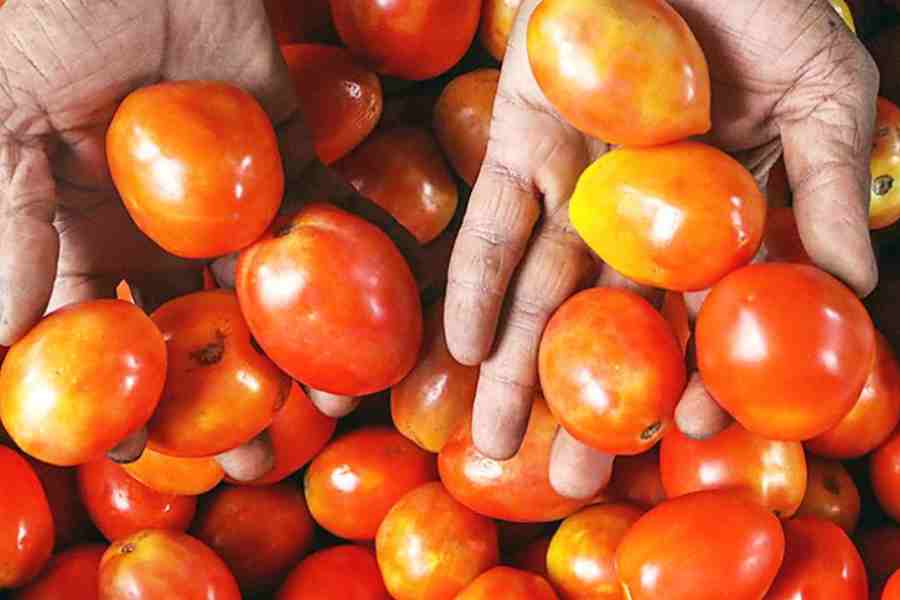Sour note
Sir — Unable to combat the rising price of tomatoes — they cost Rs 170 per kg in Delhi yesterday — McDonald’s has stopped using tomatoes in its burgers across India. While there can perhaps be no replacing tomatoes in a burger, the vegetable now ubiquitous in Indian meals was only imported to this country in the 16th century by the Portuguese. There are several native alternatives to tomatoes which can create a more layered flavour profile. Yoghurt would be the most commonly available replacement. There are regional alternatives too, like raw mangoes in Bengal, ambat chuka in Maharashtra, kokum along the Western Ghats, thekera in Assam and so on. Cooking with local ingredients can help ease the pressure on the domestic budgets of the middle class.
Nandini Das, Bengaluru
Wild waters
Sir — The monsoon rains are causing havoc in North India, with flash floods and landslides claiming several lives. If the rains continue unabated, the government should be prepared to evacuate people on a war footing. Flood defences, too, must be improved. The poor are the worst-hit during natural disasters. This has to be taken into account while planning rescue and relief operations.
Excessive rainfall has long-term effects as well. By washing away the fertile topsoil, it affects agricultural production. The problem of flooding is often aggravated by deforestation, which leaves the soil vulnerable.
G. David Milton, Maruthancode, Tamil Nadu
Sir — Torrential rainfall has caused immense damage in several states, including Himachal Pradesh, Punjab and Haryana. Over 30 people have lost their lives due to landslides and flash floods triggered by the heavy rainfall. Severe rain in New Delhi also caused waterlogging and affected people’s daily lives. Adverse weather events have now become frequent and are taking a toll on the lives and livelihoods of people and causing damage to infrastructure. The authorities should invest in climate-resistant architecture.
M. Jeyaram,Sholavandan, Tamil Nadu
Equal access
Sir — The country’s development depends on the education of its citizens. It is thus heartening that Gumla district in Jharkhand has recently opened a library for women readers to enhance their educational skills (“Jharkhand’s first library for women”, July 10). It is a state-owned library with modern facilities and a vast range of books on several subjects. Many of Jharkhand’s female students are tribal women who can benefit from this affordable mode of education. The state government’s effort to champion women’s education is laudable.
Shyamal Thakur, East Burdwan
Food on the plate
Sir — The lieutenant-governor of Jammu and Kashmir, Manoj Sinha, has announced the provision of an additional 10 kg of ration at subsidised rates to 57 lakh priority households in the Union territory under the Prime Minister’s Food Supplementation for Priority Households Scheme. This welfare measure, especially during the ongoing inflation and climatic disaster, is commendable. Instead of indulging in partisan politics, other states and Union territories should follow suit and try to address the increasing food prices.
G. Champa, Patna
Cutting costs
Sir — The railways ministry is offering discounts on air-conditioned seats in all trains to address the problem of low occupancy. This shows that the introduction of the Vande Bharat Express trains has adversely affected occupancy in existing trains, which operate on the same routes and are already suffering owing to the withdrawal of concessional fares. Many of these express trains that were manufactured at a considerable cost have reported low occupancy rates owing to high fare structures and no significant reduction in travel time. The ministry was trying to comply with the government’s desire to roll out 75 of these trains to mark the 75th year of Independence despite economic setbacks.
Kamal Laddha, Bengaluru
Sir — The fares of AC chair cars and executive classes of all trains, including the Vande Bharat Express, will be reduced by up to 25%. This is a welcome step. One hopes that the security of the passengers will also remain the ministry’s priority while reducing the fares.
K. Mazhar, Hyderabad
Loose tongue
Sir — Pradeep Kurulkar, a scientist from the Defence Research and Development Organisation, has been arrested for providing sensitive information to an allegedly Pakistan-based intelligence operative. Kurulkar shared details about the Brahmos missile and the Agni-6 missile launcher, among other things. The defence ministry must take action against Kurulkar.
Dattaprasad Shirodkar, Mumbai
Careful utilisation
Sir — The World Bank has approved a sum of $1.5 billion to finance low-carbon energy development in India. However, the government should not take credit for the achievements made under this fund before the general elections. Instead, it should carefully utilise the fund for the nation’s development.
M.T. Farooqi, Hyderabad
Urgent need
Sir — World Population Day — the theme for this year was ‘unleashing the power of gender equality’ — is observed annually on July 11 to highlight the urgent problem of overpopulation. Promoting gender equality and spreading awareness about reproductive health will be of no use unless we hear the demands of women from marginalised communities. They should be familiarised with their legal rights.
Tashi Baheti, Ujjain










